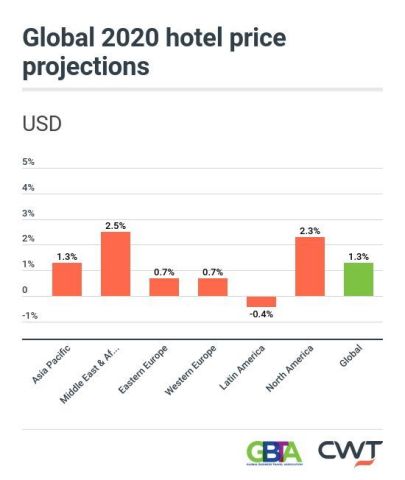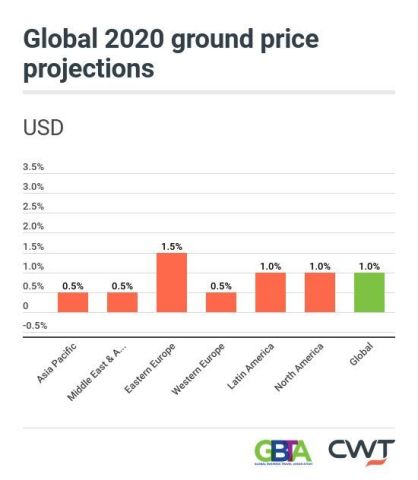MINNEAPOLIS & ALEXANDRIA, Va.--(BUSINESS WIRE)--After posting sharp rises in 2019, prices in the global travel industry are likely to slow in 2020, with flights rising a modest 1.2%, hotels rising only 1.3%, and rental car rates up 1%, according to the sixth annual Global Travel Forecast, published today by CWT and GBTA. While the global economy is doing well overall – and expected to grow a solid 3.6% in 2020 – a raft of uncertainties are set to put a damper on pricing.
“The risks and ambiguity have increased over the past few months – not least the threat of escalating trade wars, the impact of Brexit, possible oil supply shocks, and the growing likelihood of recession,” said Kurt Ekert, CWT’s President and CEO. “This forecast will help travel buyers make the right decisions in an increasingly challenging environment.”
Released today by the Global Business Travel Association, the voice of the global business travel industry, and CWT, the B2B4E travel management platform, the 2020 Global Travel Forecast uses data generated by CWT Solutions Group, to give an early look at the trends and developments that will shape the business travel industry in the year ahead.
“Technological advancements and an increasingly volatile economic and political landscape across the globe have changed the way today’s travel buyers need to do their jobs,” said Scott Solombrino, GBTA COO and Executive Director. “This annual forecast provides insights into the key drivers forcing these shifting priorities and gives a road map for travel buyers looking to plan their 2020 travel programs.”
Asia Pacific |
|
|
||||||
Air: 1.3% |
Hotel: 1.3% |
Ground: 0.5% |
||||||
Asia’s expansion has slowed down due to worsening US-China relations, tighter global financial conditions, and natural disasters. But the region remains the most dynamic, with steady GDP growth, benign inflation, and a sense of optimism.
- Air: In Asia Pacific, the shutdown of India-based Jet Airways’ operations in April created a gap in the market for some key routes, and the reduced competition has meant higher airfares – but with other airlines adding capacity to fill the vacuum, fares have begun to normalize.
- Hotel: Asia’s hospitality industry is booming with hotel investment volumes predicted to grow 15% year-on-year. Japan will host the Rugby World Cup later this year, and the Olympic and Paralympic Games in 2020, which will boost visitor numbers to the region. The Japanese hotel market is seeing a sharp increase in supply to accommodate the anticipated surge in visitors to the country during these events.
- Ground: In China, steady demand and increased competition will hurt car suppliers. Across Asia Pacific, ride-sharing is booming, with many companies allowing their employees to use these services for business travel. Providers like Didi Chuxing, Grab, Go-Jek and Ola are pursuing aggressive expansion plans, while also taking steps to put more stringent safety measures in place.
Europe, Middle East & Africa |
||||||||||||
Eastern Europe: |
Air: -0.2% |
Hotel: 0.7% |
Ground: 1.5% |
|||||||||
Western Europe: |
Air: 0.5% |
Hotel: 0.7% |
Ground: 0.5% |
|||||||||
Middle East & Africa: |
Air: 2.2% |
Hotel: 2.5% |
Ground: 0.5% |
|||||||||
The International Monetary Fund (IMF) expects steady growth, ranging from 0.3% in the Middle East to 1.6% in Europe, and 3.6% in Africa. Across Europe, labor unrest, climate change protests, global trade wars, rising oil prices and regional terrorism all have the potential to cause a slowdown.
- Air: Istanbul’s new airport, one of the largest in the region, will likely change flows between Europe and Asia, providing an alternative stopover point for flights to China and Eastern Asia.
- Hotel: Denmark and Egypt are both countries to watch, with hotel prices in Denmark expected to fall next year. On the other hand, Egypt’s rates are on the up - projected to rise by 4.7% - as its economy settles down after a period of unrest.
- Ground: Eastern Europe’s franchise model for rental car businesses will see slightly higher growth of 1.5%, due to supply and demand in the region. Rail prices still vary greatly across EMEA due to inconsistent regulation.
Latin America |
|
|
||||||
Air: -1.6% |
Hotel: -0.4% |
Ground: 1% |
||||||
Economic activity in Latin America continues to grow – albeit slower than anticipated – and is expected to rise 2.5% in 2020. A volatile political and economic situation in some of the largest economies like Argentina, Mexico and Brazil will hurt prospects.
- Air: Given the long distances, a growing middle class, and low market penetration of air travel, there are many opportunities, and airlines are making the best of them. Since 2017, several new carriers have entered the market and low-cost carriers have gained significant share in Brazil, Mexico and Colombia.
- Hotel: Following a steady decline in new hotels from a 2015-2016 peak, things may be picking up, with Mexico leading the way. More than 10 new corporate chain hotels opened in the region in the first quarter of 2019 with growth set to continue throughout 2020. Properties in Mexico and across Latin America are likely to continue to cut prices.
- Ground: A slight increase for rental cars is driven by growing demand in Brazil, the region’s biggest economy. Rental car companies report a cultural shift towards sharing cars rather than owning them, and growth in tourism is also boosting the industry.
North America |
|
|
||||||
Air: 2.3% |
Hotel: 2.3% |
Ground: 1% |
||||||
While the US economy is thriving, there is growing uncertainty, due to tariffs and trade wars. US GDP growth is set to slow to 2.1% in 2019, and slow further in 2020 and 2021, to 2% and 1.8%, respectively.
- Air: Flight prices are expected to rise, reflecting the strong economies of the US and Canada. Most airlines are looking to ancillary fees as a way to stay competitive, so costs of services like Wi-Fi and lounge access may be up for negotiation for corporate travelers.
- Hotel: The hotel industry has seen slow, but steady growth. A gradual slowing will help rates return to normal, correcting the high prices seen in some of the major cities. Technology-focused areas – like San Francisco, San Jose, Seattle and Vancouver – are still seeing growth. However, demand in these cities has been high for so long that prices have risen too far – and business travelers are staying further out in response.
- Ground: Due to the nature of long-term contracts, we are unlikely to see any upward trends in pricing until 2021 or 2022. Traveler preferences are dictating a change in car preferences, shifting away from traditional sedans in favor of more versatile SUVs and trucks.
For more detailed information, download the 2020 Global Travel Forecast now.
The projections in the 2020 Global Travel Price Forecast are based on:
- A statistical model developed by GBTA with market and economic research firm, Rockport Analytics, that evaluates historical price behavior and forecasts future prices in the air, hotel and ground categories.
- The market-specific expertise and travel industry knowledge of CWT and CWT Solutions Group personnel worldwide.
- Information sourced from Moody’s Analytics, the International Monetary Fund Research Department, the United Nations and other leading organizations.
Projections are based on transaction data from CWT’s global client portfolio, including anonymized client travel patterns, over the past ten years. Key macroeconomic and per-country indicators, such as current and expected GDP growth, the consumer price index, unemployment rates and crude oil prices, were used in the statistical model, as well as key supply-side drivers sourced from OAG and STR Global. All air statistics represent point of origin and include all trip types.
More information
Learn more about the Global Travel Forecast and the price projects and trends that lie ahead in 2020 during an education session at GBTA Convention 2019 on Monday, August 5 at 9:30 am CST in room S504ab.
A webinar will also be taking place for a deeper dive into the research findings featuring experts from CWT, Rockport Analytics and GBTA. This session will take place on Thursday, September 19 at 9:00 am CST. Register today.
About the Global Business Travel Association
The Global Business Travel Association (GBTA) is the world’s premier business travel and meetings trade organization headquartered in the Washington, D.C. area with operations on six continents. GBTA’s 10,000-plus members manage more than $345 billion of global business travel and meetings expenditures annually. GBTA delivers world-class education, events, research, advocacy and media to a growing global network of more than 28,000 travel professionals and 125,000 active contacts. To learn how business travel drives lasting business growth, visit www.gbta.org.
CWT is a Business-to-Business-for-Employees (B2B4E) travel management platform. Companies and governments rely on us to keep their people connected – anywhere, anytime, anyhow – and across six continents, we provide their employees with innovative technology and an efficient, safe and secure travel experience. Every single day, we look after enough travelers to fill more than 100,000 hotel rooms, while our meetings and events division handles more than 100 events every 24 hours.
Follow us on Facebook, LinkedIn, and Twitter.







